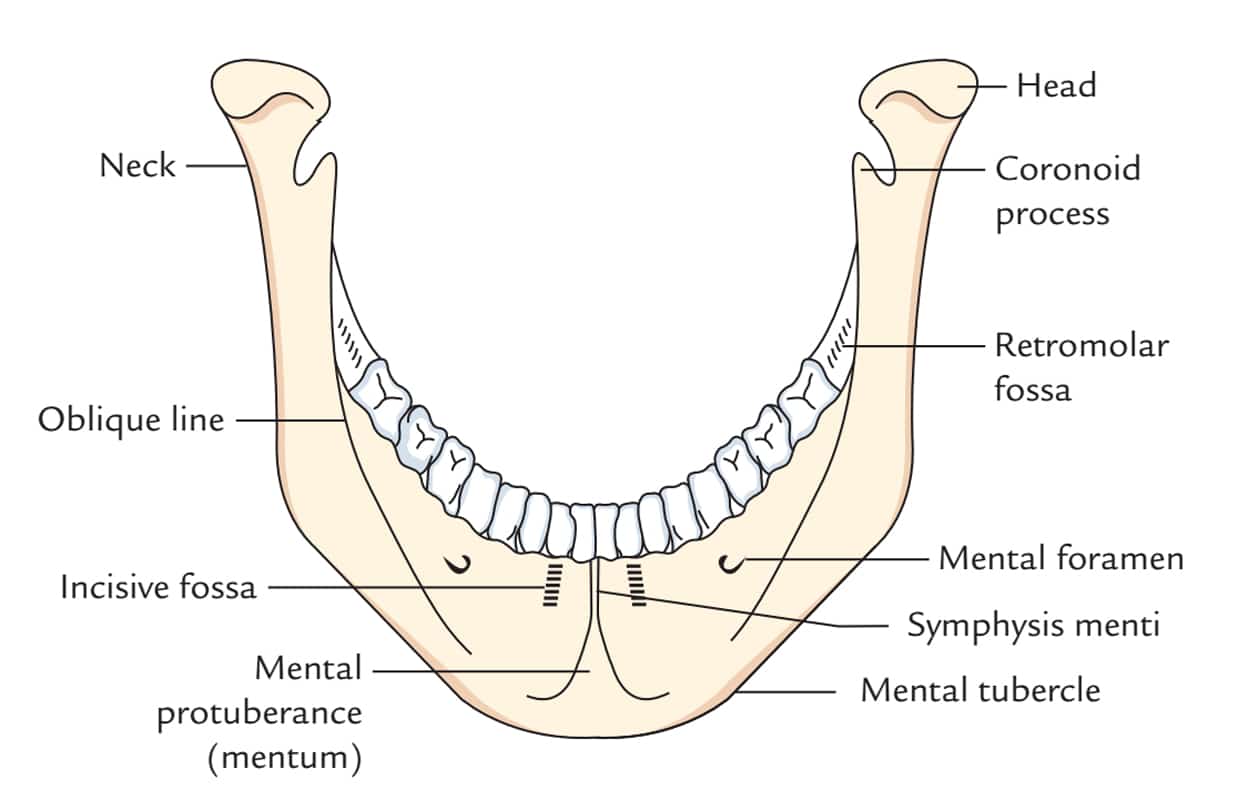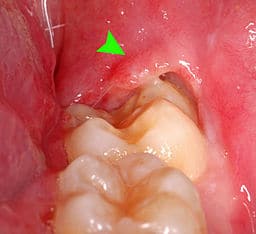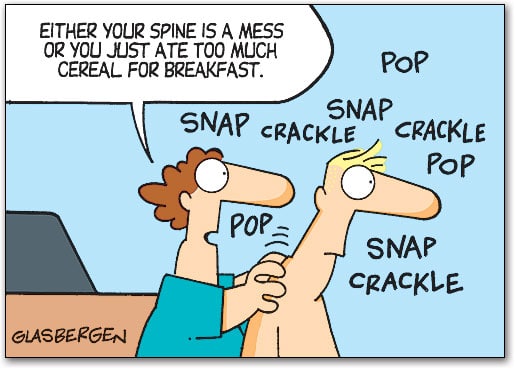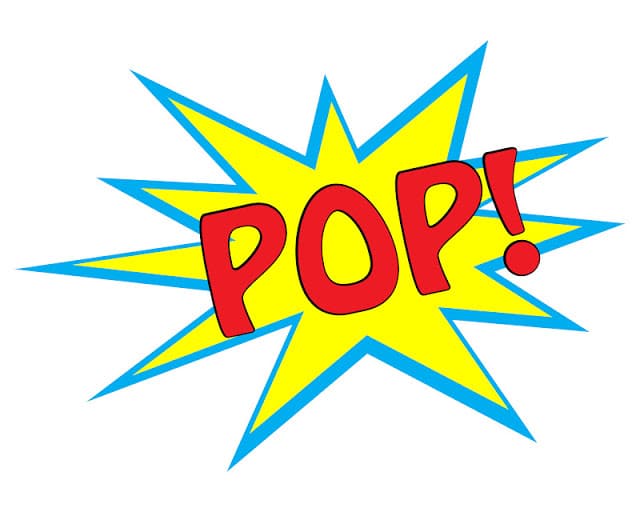Jaw popping isn’t a very comforting feeling. It’s not quite the same feeling as the opening pop of a champagne bottle, or the exhilarating sensation of the pop of a firework. It would be nice if jaw popping had that kind of excitement, but unfortunately it does not. When you open your mouth and your jaw pops, it’s unsettling. You may be concerned, but should you be? Let’s explore everything you need to know. We’ll discuss why it happens, what you can do to help jaw popping, when you need to be concerned, and provide the answer to your question…why does my jaw pop?
What is jaw popping?
First things, first, let’s talk about what is jaw popping. We’ll get to why it happens, but first I need to get you up to speed with the anatomy. The lower jaw is called the mandible. It is a single bone, but it is complicated. It is one of the only bones in the human body that connects to both sides of the body. When you think of the lower jaw, I want you to think: its one bone with two hinges on the sides of the head. The hinges are the temporomandibular joints. Most people call them TMJ for short, because humans love three-letter acronyms.
Now that’s what leads us to the answer. The TMJs are where the jaw popping occurs. Think of the TMJ as a ball and socket joint. The top of the jaw is the ball, and the side of the head is the socket. But here’s where it gets interesting, there is a disc in between the ball and socket. The popping sound you hear happens as the TMJ opens and closes. Essentially you are hearing a misalignment of the TMJ, as the disc snaps out of alignment and back into alignment.
Why Does my Jaw Pop?

If you know me, you know I’m big into analogies. Who would want to read medical jargon when it can be simplified? So that’s what we’ll do.
Remember how we talked about how the jaw is like a hinged sling on both sides of the head? I want you to think of the jaw as a hammock swinging from a tree. The hammock is the lower jaw, and the hinges are the TMJs.
When the hammock is balanced, everything swings comfortably. But what if the hammock had an uneven load? It would swing, but probably not smoothly, right? As it swings, you would notice that the hinges would begin to pop and snap at some point before it changes direction again. The same thing happens to the jaw. The pop and clicks you hear are because there is a disharmony in the way one side is functioning versus the other.
Now let’s do a test to see if your jaw is popping.
Put your fingers in front of both ear canals and open and close your jaw. Do you feel movement in that area as you you’re your jaw? Those are your temporomandibular joints (TMJ). If you feel a “pop,” that means there is a disharmony in how your joint is working. The louder the pop, the more out of line the joint is. Now if your jaw popped during that test, I bet I know what your thinking, do I need to be worried if my jaw pops? Let’s discuss that next.
Is it Bad if my Jaw Pops or Clicks?
So if your jaw pops it will be comforting to know that you are not alone. Jaw popping is a relatively common condition. To be exact, there’s about 30% of the world population who have some degree of jaw popping. So do you need to worry about it? The easiest answer is only if you have other symptoms along with it that are impacting your life. If there aren’t any other symptoms that are impacting your life jaw popping is usually something that can just be monitored over the years. What do I mean?
If you jaw popping is painful, or if it limits your ability to open your mouth to chew or speak. If your jaw gets fatigued easily or if your jaw is sore throughout the day. How about if you get headaches often, or have ear pain?
These are all signs that your jaw popping is a disharmony that is potentially creating other symptoms.
That’s when you should have it looked at by a TMJ specialist or your primary care physician. What all those symptoms have in common is that they are all symptoms of what is called TMJ dysfunction or also called temporomandibular disorder.
TMJ dysfunction is a condition that incorporates a varying degree of symptoms due to strain caused by the disharmony of the jaw, TMJ, and muscles. The condition can cause symptoms that really begin to impact a person’s life. Symptoms common to the TMJ dysfunction are teeth clenching or teeth grinding (bruxism), headaches, ear pain, ear ringing, jaw muscle fatigue, lockjaw, or limited jaw opening. These symptoms can come in a variety degree of severity and some patients may have only one sign while others could have several. And it TMJ dysfunction doesn’t stop there. If you want a more in depth dive check out the ultimate TMJ guide here.
What Makes Jaw Popping Worse?
With jaw popping, a lot of times you’re not doing anything wrong. The jaw popping happens from your anatomy. However, there are some things you can avoid to help find relief. Some ideas that have worked for some patients to reduce jaw popping are:
- chew gum less
- avoid biting your fingernails
- try not to grind your teeth
- avoid clenching your jaw
- try to limit thrusting your jaw out
- avoid chewing on pens and pencils, etc
Certain habits like the ones above as associated with jaw popping. Now here’s the thing, some of the things you can’t always consciously control. As much as I tell you to stop grinding your teeth or thrusting your jaw out, you will catch yourself still doing it. And that’s okay. It’s a sign that there is disharmony and your jaw is subconsciously trying to find balance. If you still have trouble after trying to make these changes, its an indication that you should see a TMJ specialist.
What are Other Conditions that Cause Jaw Popping?
So far, we talked about TMJ dysfunction and how it relates to jaw popping. TMJ dysfunction is by far the most common cause of jaw popping, but there are some other causes that we should review. Here we go.
Arthritis
Arthritis is an autoimmune inflammatory disorder that can cause damage to the cartilage of the temporomandibular joint. Both rheumatoid arthritis (RA) and osteoarthritis (OA) can affect the jaw. Because arthritis breaks down the cartilage of the TMJ over time, it makes the jaw movements unsupported in the joint socket which can create jaw popping.
Broken or dislocated jaw
Think back over the years. Did you ever have an accident when your jaw unfortunately received an impact? The most common causes are from motor vehicle accidents, a slip and fall, or sports injuries. If you have sustained an injury, you might have a broken or dislocated jaw. A dislocation occurs when the jaw joint becomes unhinged due to force.
Occlusion of the teeth
The occlusion of the teeth is a fancy way of saying how the teeth fit together. Because the teeth are in the upper jaw and the lower jaw, it’s like a puzzle piece fitting together. Depending on how the puzzle piece fits together, the teeth can cause the top and bottom jaw to fit incorrectly, which leads to strain, disharmony, and yes you guessed it—jaw popping. The complicated thing here is that even if a person has beautiful looking teeth, it might not be the ideal position for their jaw. That’s why people with beautifully aligned teeth can still suffer from jaw popping.
Myofascial pain syndrome
Myofascial pain syndrome (MPS) causes chronic pain in the musculoskeletal system. Essentially the muscles have localized tension and flare-ups known as trigger points. These trigger points cause pain when pressure is applied, and the tension in the muscles can overpower the TMJ ligaments on either side to cause the jaw to pop.
Infection
The thing about infection is at least usually its more obvious of when there is a problem of concern. Most people with an infection will feel pain, have a feeling of inflammation or warmth, have pus in the area, or may have a fever. These are all signs that are much more obvious than some of the other conditions that link to jaw popping.
An infected salivary gland can lead to TMJ and jaw popping; however, the most common cause of jaw popping from infection is the wisdom teeth.

Because the wisdom teeth are in the back of the mouth, the swelling around a wisdom tooth infection can easily prevent the jaw from opening well on that side. The swelling creates a disharmony that inhibits movement and can cause jaw clicking and popping. Any patient with limited jaw opening from the ages of 15 to 30 who hasn’t had their wisdom teeth out, should first have an x-ray of their wisdom teeth before considering any other treatment related to the jaw. Often after having the troublesome wisdom teeth out, the jaw popping and TMJ dysfunction will improve.
How to Treat Jaw Popping and TMJ issues
We talked about a lot of why jaw popping is caused, but now it’s time to give you answers of what you can do if jaw popping has become a burden in your life. Let’s first go over some simple at-home remedies you can do for jaw popping.
Try these remedies for a couple of weeks and if you do not get any relief, it’s probably a good idea to have a consult with a TMJ specialist. We’ll talk about what they can do for you as well.
At-Home Remedies for Jaw Popping
- OTC medications such as ibuprofen can help reduce inflammation
- Apply a warm compress to the affected area on the jaw for 10 to 15 minutes. You may see that sometimes cold ice packs are recommended. Cold compresses are typically done if you suspect there is an infected tooth like a wisdom tooth causing the jaw to lock.
- Avoid eating crunchy, chewy or hard foods, including raw vegetables and fruits, caramel, popcorn, gum or candy. Stick to softer foods like soup, yogurt, oatmeal, rice, quinoa, etc.
- Relax the jaw and relax the mind when possible.
- Avoid activities that involve opening the mouth too wide, such as singing, yelling or chewing gum until symptoms improve.
Medical and Dental treatments for Jaw Popping and TMJ
- An orthotic or splint can be used to help stabilize the jaw into better harmony, which reduces the strain and popping.
- Muscle relaxers such as Robaxin can be prescribed to reduce muscle tension contributing to the popping.
- Orthodontics can help to realign the top and bottom jaw into better harmony and function
- The teeth can be equilibrated or balanced. If a filling or crown is too tall it can affect the way one side is functioning compared to the other.
- The teeth can be restored to provide support if there are missing teeth, broken teeth, or teeth that are worn excessively.
- As a last resort, surgery may be required which happens in less than 5% of all cases.
Exercises to Help with Jaw Popping
Be Aware of Your Postural During Your Day
Poor posture, such as holding your head forward or to the side can contribute to TMJ disorder. Make sure you are maintaining good posture throughout the day and not performing repetive tasks that strain your head and neck. A TMJ exercise to assist with developing good posture and relieve stiffness is below:
- Stand with your back and shoulder blades against the wall.
- Bring your shoulder blades together to draw your shoulders back and down.
- Tuck your chin and shift your head until the back of your head touches the wall.
- Hold this position for up to 30 seconds and release.
- Repeat five times.
Tongue Exercise
The tongue is actually a pretty powerful muscle and it can be involved with strain that causes jaw popping. Here is an exercise that might help, as recommended by Cork University Dental School & Hospital.
- Gently rest your back teeth together.
- Rest the tip of your tongue behind your front teeth.
- Curl your tongue along the roof of your mouth, as far backward as possible.
- Keeping your tongue in this position, slowly open your mouth.
- Hold this position for five seconds; then relax for five seconds.
- Repeat 10 times.
Stretch your Neck
The neck indirectly can have an affect on the jaw muscles. Its not always related but it’s good to rule it out. Here is an exercise that helps to stretch the neck.
- Sit comfortably with your shoulders and head in a neutral position.
- Tilt your head forward and gently press your hand against the back of your head to increase the stretch.
- Hold for up to 30 seconds and return to the neutral position.
- Look up and extend your chin toward the ceiling, while keeping your head from falling backward.
- Hold for up to 30 seconds and release.
- Tilt your head to the right and gently press against the left side to increase the stretch.
- Hold for 30 seconds and repeat the same motion on the right.
- Circle your head clockwise four times, keeping your head from falling back past your shoulders; then rotate counterclockwise.
Stretch your Jaw
Obviously the muscles and ligaments of the jaw are directly involved in the function of how the jaw pops or clicks. Here is an example of an exercise that can help stretch and loosen your jaw muscles.
- Sit comfortably and open your mouth as wide as is comfortable.
- Gently press your hand or fist against the front of your jaw to increase the stretch.
- Hold for up to 30 seconds. If you feel pain, stop.
- Slide your jaw to the left and gently press against the right side of your jaw with your hand or fist.
- Hold for up to 30 seconds. If you feel pain, stop.
- Slide your jaw to the left, press and hold for 30 seconds and release.
- Repeat each exercise four times.
Snap, Crackle, and Pop: Final Thoughts

So there’s everything you wanted to know to answer why does my jaw pop, and even some more info that you didn’t want to know. The key takeaways are that you shouldn’t lose sleep over your jaw popping. If you are losing sleep, it’s time to see a professional.
Jaw popping occasionally shouldn’t be too much of a concern and can be watched. If your jaw is often popping and is compounded with other symptoms, it’s best to take action. Try some of the home remedies in this article first. If you are still having issues after a couple of weeks, speak with your dentist about your concerns. He or she may refer you to a TMJ specialist to explore further, and they will put you on the path to relief.


